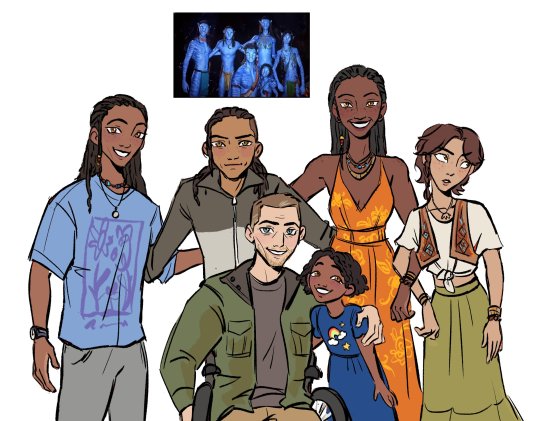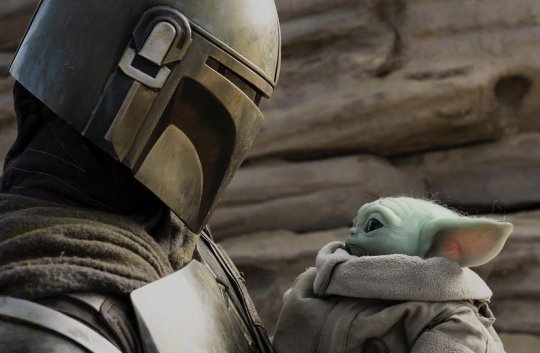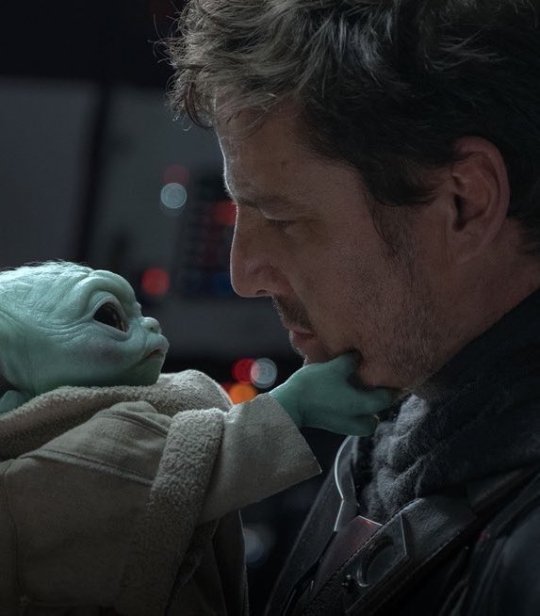Text
If a father is left with a child and he doesn't know what to dress the child in, what to feed them, what diapers to buy etc. - that means he has been completely uninvolved in the child's care, which means he has been a bad father and a bad partner. So if a writer wants to create a good father character, please do not make him completely clueles 🙈
(My husband can take care of our children on his own 🙃)
5 notes
·
View notes
Text
Fanfiction is like karaoke.
Most people do it for fun. They share it with other people for fun. They write / sing in public in a designated place, but they don't want to be great writers / singers and they don't need negative comments.
Unless someone openly says they want to be a professional writer / singer and asks for constructive criticism, don't offer it.
67 notes
·
View notes
Text
I've finally got to know why something didn't feel right for me in the Finn's story in The Last Jedi. The story gave him the reason to fight the First Order, showing him the backstage od war. But he had already known it. He didn't need a reason, he needed hope that fighting FO is not a lost cause.
2 notes
·
View notes
Text
D*enerys is not the heroine of ASOIAF, nor is she truly a villain, instead she occupies the niche I like to call “The Anakin Skywalker Role”
To expand on that, that is a character who starts off as a hero, one who wants to do good and change the world, but through various actions of increasing depravity becomes the villain. These actions are not normally provoked by malice, but perhaps initially by the loss of someone close to them, think here how Anakin slaughtered the Tuskens after the death of his mother, or how D*enerys burnt a slave woman alive after the death of her husband and child.
As the audience we recognise that these actions are terrible, and yet we almost understand them as well. Grief and loss are terrible things, and the media is full of heroes who do violent things in the name of grief and love (John Wick is just one very obvious example of this).
At this point the majority of the audience don’t register their actions as ‘villainous’, nor do the majority for quite some time after that. Slowly though their actions continue in this same vein, actions hidden beneath a veneer of ‘doing the right thing’ or ‘caused by loss and grief’; think here of Anakin assaulting Rako Hardeen during the Deception Arc, or of the way he reacts around Rush Clovis; or think of D*enerys crucifying the Masters regardless of their guilt, or burning someone who offered her insult.
The whole time their actions are hidden by a veneer of respectability, of doing the right thing, of fighting for good. Anakin fought for the Republic, for Democracy; D*enerys fought to free the slaves and to find a home. Honourable intentions, there is no doubt of that, and yet there is the reason the phrase “The road to hell is paved with good intentions” exists, and that is that good intentions mean nothing if your actions cause suffering along the way.
Eventually though, the hero does something so terrible that you can no longer make excuses for them. Whether, in Anakin’s case this is assisting in genocide and child murder and the downfall of democracy; or in D*enerys’ case the burning of Kings Landing. This is the point where you look back and realise that this fall from grace was inevitable, that they were always going to go this route. And that is one of the saddest types of arc, one where you see how all this potential and all the good intentions have faded and warped, until nothing but paranoia and a lust for power and violence remains.
#anti daenerys targaryen#Not really anti as I think she was an interesting character#Got is not black and white
35 notes
·
View notes
Text

sully family photo human edition by @calsz0ne on Twitter and @caffecal on tumblr
click for better quality
17K notes
·
View notes
Text

[A meme. A man with a lownmower with a description: "Din trying to enjoy mandalorian family life". A tornado behind his back with a description: "Moff Gideon, Darksaber, Mythosaur".]
87 notes
·
View notes
Text
I think Grogu in human years would be about 2-3. He physically quite capable (he can walk, is potty trained :p), but still a bit clumsy and slow. He doesn't really speak, only some words. And his look is still babyish.
9 notes
·
View notes
Text
Din knew the right size of the beskar shirt for Grogu ❤️
(Maybe he remembered how he could embrace the kid or the size of his coat when he washed it.)
7 notes
·
View notes
Text
You know what's interesting? Din didn't really want to become a dad, but not because he doesn't like kids, but because he felt like he couldn't provide a good life for one.
Din's instinct when seeing Grogu for the first time was to wave his finger at the kid. He doesn't have a distaste for children, if anything he has always had a soft spot for them.
"Travelling with me... It's no life for a kid".
Din didn't want one because he didn't think he could be a good father. But he can, we've seen it. He likes the companionship and I think it's something he's always craved.
Din's journey with Grogu isn't so much him learning to enjoy having kids around so much as it's him learning that he can be a father, that that's something he's capable of doing.

It's refreshing to see that they didn't go with "the macho bounty hunter who hates kids learns to love them" but instead went for "bounty hunter with a soft spot for kids learns that he can actually be a good father".
1K notes
·
View notes
Text
The Evolution of Din as a Father
One of the things I love about The Mandalorian is how you get to see the relationship between Din and Grogu grow.
I know we talk about how much of a dad Din is in some of the earlier episodes (particularly Eps 1-3) but actually I think that there is a change in Din's attitude towards Grogu: from a natural instinct to protect him to actually viewing him as his own child.
I've spoken before about how Din has always had a soft spot for kids and that he naturally feels quite protective of them. In some ways this is just a natural response of people to look after those who are vulnerable, but I do believe that a lot of it also comes from his background and Mandalorian culture.
Din is initially protective of Grogu because he is young and vulnerable. He knows that someone is going to have to look after the little guy and he takes on that role. I don't believe the reason he went back for Grogu is because he instantly thought "this thing is my son now" but because he couldn't leave an innocent child in the hands of those people. It would be against his moral code to do so.
And it stays this way for a few episodes. Din agrees to help Grogu because he wants the child to be protected, to return to his family/home. He didn't necessarily go into this with the attitude of a father but the attitude of a protector. He didn't just decide to become a dad on the spot.
But over time, he begins to view Grogu as his own. Those natural protective instincts begin to grow into more fatherly ones. The way he views his relationship with Grogu shifts.
For me I believe this begins to happen during the time skip in Chapter 4. Before then I think that Din was making sure that an innocent child didn't get hurt, doing what he was given the job to do. But spending time on a quiet backwater planet with the child allowed his attitude towards him shift. And from then on I think that's where the real father-son dynamic begins to develop.
It becomes even more prominent in season 2. There is a very clear change as Din starts viewing Grogu as his own child. The sacrifices he makes for him become greater, his attitudes towards protecting him become much more personal.
I actually love that we get to see this relationship grow. And yes, as I mentioned earlier, we definitely talk about Din being such a dad in the first couple of episodes, but actually watching the show I love how Din becoming an actual father to Grogu doesn't feel so unnaturally sudden. It isn't a case of looking at Grogu and thinking "he's mine now" (as much as we love to joke about this). It's the changing feelings that are so beautiful.
The flow from "I will protect this child because it's the right thing to do" to "you know what, having him around actually brings me comfort" to "I don't want to think about a life without him in it".
It's such a good narrative because it actually grows. We see the progression across the series and I love how natural the progression of Din and Grogu's relationship feels.

254 notes
·
View notes
Text
I find it very sad that Philip and Peter didn't keep in touch.
Did Philip shut himself do much that Peter's attempts at contact remained unsuccessful?
Or were the attempts successful, but Philip seemed to be changed, even boring, or seemed to move on with his life on a different direction and after some time Peter stopped spending time with him?
Or did Peter move on and kind of forget about his brother, unaware that the latter was heartbroken?
And over a decade they had no contact though both seemed to wish they did.
5 notes
·
View notes
Text
ISFJ
I believe that Data (”Star Trek: The Next Generation”), Ron Weasley (”Harry Potter” - books) and Mando (”The Mandalorian”) are ISFJs.
Czytaj dalej
14 notes
·
View notes
Text
I've seen that quite a lot of people don't like Rey's outfit in TROS. As much as I find TROS awful, I've been thinking about Rey's outfit and I've come to conclusion I like it. It seem comfortable and suitable for travelling and fighting, which is important as, she is a Jedi, in the Resistance. I don't think she needs to change her style much through the movies. Louise hair is impractical and I interpret the white color that she conciously chose the light side. She added the hood as a Jedi accessory, but she kept her style, which means to me that event though she became a Jedi, she remains true to herself.
6 notes
·
View notes
Text
“For some reason, Hollywood only works in extremes—it’s either you’re a swooning love interest or a tough-as-nails action girl. We haven’t really subverted anything by championing the tough girl trope, but instead, we heightened the demand for the ideal woman. This rhetoric has brought to question female protagonists who do have a man as an object of their desires. In 2012, ‘The Hunger Games’ trilogy brought a range of discourse into YA lit and blockbusters—human suffering as entertainment, the inevitability of history repeating itself, fascism and oppression, and whether Katniss chooses Peeta or Gale by the end of 'Mockingjay.’ While a chunk of THG’s fandom debated on these good ’ol shipping wars, there are those who retaliated, asking questions like: 'Why can’t she be alone?’ and 'Why did Katniss have to end up with someone, when she was perfectly capable of being by herself?’ And therein lies the problem. Female characters are denied human companionship to prove themselves as a strong character. They must walk alone in their heroine’s journey, so they wouldn’t be defined by their relationships. Having a lover meant weakness, it veered too close to being emotional. Romance signified submissiveness, as if it were ignoring the major leaps the 'strong female character’ has taken. This is a demand unique to the female protagonist, when the value of their male counterparts aren’t weighed down by their romances. Audiences never think to question if they’re allowed to be with someone. Superman has Lois Lane without their relationship diminishing his worth as a superhero. Bruce Wayne and Selina Kyle are helmed as pop culture’s iconic love-hate item, without anyone crying foul for Bruce’s sake. On the contrary, Rey from 'Star Wars’ can’t exchange a deeper dynamic with Kylo Ren without anyone painting her as a victim. Rey’s narrative is rooted in loneliness and her desire to be freed from it, yet some see her walking into the binary sunset in passable solitude, cue John Williams’ end music and starry credits. In the same vein, Katniss can’t frolick into that idyllic epilogue with Peeta Mellark and her two-point-five kids. Here’s the TLDR version and what this all boils down to: internalized misogyny.”
— Katrina Maisie Cabra, ‘Why heroines having love interests is important’ (Scout Mag)
215 notes
·
View notes
Text
<3
Aurora, about to introduce Diaval: (I'd say he's my dad, but technically he isn't. I'd say he's Maleficent's partner, but theoretically he isn't. Officially he's her servant, but I can't say that, it's ridiculous...)
Aurora: This is Diaval.
503 notes
·
View notes
Text
The Rise of Skywalker - alternative story (part 3)
<- part 2









The End
19 notes
·
View notes
Text
The Rise of Skywalker - alternative story (part 2)
<- part 1










part 3 ->
23 notes
·
View notes